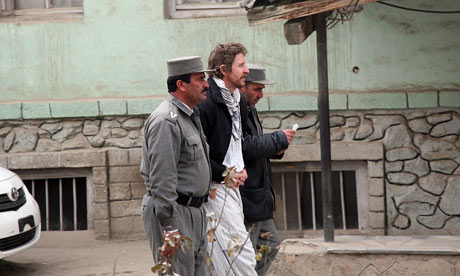Rangers may search and arrest without a warrant; may use all reasonable force necessary to affect arrest; may bear arms and use them in life threatening circumstances; and in doing any of the above in the course of duty, rangers are not liable to prosecution; (This became necessary when arrested poachers invariably and as a matter of course, brought their own fictitious charges of assault against arresting rangers, who were then prioritised and called to trial while poaching cases were relegated to the back of the queue).
Game Rangers gazetted under the Game Act or appointed by Royal Warrant have powers Kingdom wide (such game rangers can only be gazetted by order of the Head of State through the King’s Office). -From the Game Act, Swaziland
![]()
I was very intrigued with the concept of the Royal Warrant after watching this video about Ted Reilly and his war against poachers in Swaziland. He is certainly a warrior who has dedicated his life to protecting the wildlife of Swaziland, and after reading his history and the desperation of the situation in Swaziland, I was certainly impressed by his efforts.
Recently I have also highlighted other anti poaching efforts in Africa, and specifically the Iraq war security contractor Damien Mander and his International Anti Poaching Association. Both Ted’s effort in Swaziland, and Damien’s efforts in Zimbabwe and Africa highlight two examples of the kind of extreme efforts needed to combat this poaching scourge. The kind of poaching driven by such market forces as Rhino horn being worth as much as cocaine.(almost $50,000 a kilo)
It is also important to note that there has been an increase in poaching activity, and rangers in places like South Africa have been very busy arresting and killing poachers in the line of duty. But even with these efforts, the global recession and lack of jobs, along with the high value of poached animal horns and parts, the crimes are actually increasing. It reminds me of the piracy business model and how lucrative that is. I am sure in the countries with weak laws on poaching or minimal resources, it is a free for all for poachers.
So what is the answer? Well Swaziland is an interesting example of success when it comes to stopping poachers, and maybe there is something to be learned here? The Reilly family’s efforts and the tough actions against poachers blessed by the king in the form of a Royal Warrant are examples of some tough solutions. If you read through the Game Act below, it gives an idea as to the kind of teeth that is involved with this Royal Warrant. Although I am sure any lawyer reading through the act would probably freak out on how much power has been granted to these rangers, and the possibilities of abuse of their powers.
But on the other hand, the form of government in Swaziland is a monarchy and what the king wants, the king gets. lol If he wants his park rangers to drop the hammer on poachers, then so be it. It would be interesting to see what other countries have in the way of laws, as it pertains to the powers of individual rangers and officers, and see which country is most effective at stopping poaching? I would guess that the country with the strictest laws and most fearful anti poaching efforts are most successful at stopping it.
Concepts like the Royal Warrant or the Letter of Marque and Reprisal might be out of style with today’s modern states, but I think there should be an effort to look at such things and reevaluate their utility. Piracy or poaching are also old criminal acts, and yet they are still around and making a strong comeback. Are modern states and their advanced rules of law keeping up? You be the judge. –Matt
‘King gave me powers to shoot to kill’
Reilly History
The Game Act
The Rhino War
![]()
Ted Reilly feeding his pet.
‘King gave me powers to shoot to kill’
Nov 29,2009
By MFANUKHONA NKAMBULE
MBABANE – Ted Machobane Reilly, the Big Game Parks proprietor, is displaying to the world a Royal Warrant purportedly signed by His Majesty the King, giving him powers to shoot to kill poachers.
Over 25 000 people have viewed Machobane’s video displayed on the youtube.com website.Big guns that could match the AK 47 were also displayed. Reilly said the Big Game Parks (BGP) had the ammunition to counter-attack armed poachers.
The nature conservationist says in the video that commentators and poachers were trying to make a case against him because everyone knew the consequences of poaching.He said security in the game reserves under his supervision was undoubtedly the best in Africa. He said the Game Act of 1991 was passed as a result of sharp increases in poaching, adding that the rhino was the main target for illegal game hunters.
He said they sold the rhino horn for USD 15 000 (about E105 000).Reilly showed the viewers poaching towers and narrated how rangers diffused or counterattacked shootings from the poachers. (more…)
